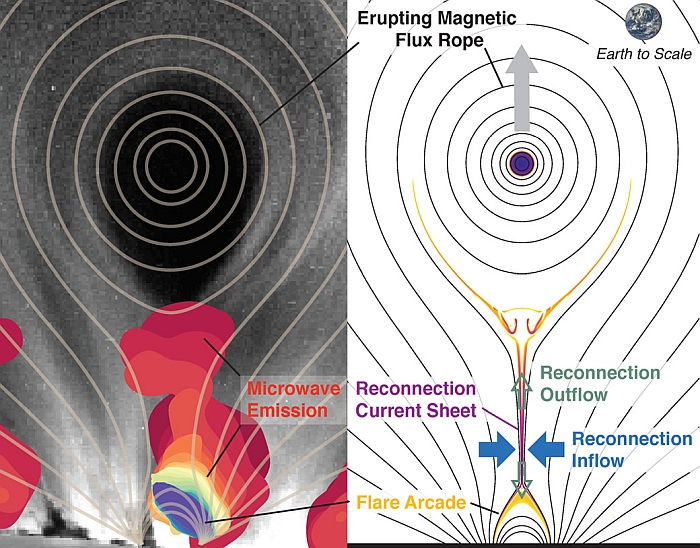
The Sun is a wild spot. Up in our skies, it shows up essentially that everyday, except when you look nearer, our star is regularly crazy with violent plasma.
Perhaps the most out of control thing the Sun can do is flare - burp out enormous circles of plasma that completely predominate our whole Earth in scale. Despite the fact that this action is very normal, we despite everything don't completely comprehend what drives it.
Presently, just because, sun powered physicists have estimated and portrayed the attractive field of the tremendous flow sheet - surface electric flow - that extends over the center flaring district, the focal motor that controls the vitality arrival of sun oriented flares.
"It has for quite some time been recommended that the abrupt arrival of attractive vitality through the reconnection current sheet is answerable for these significant ejections, yet there has been no estimation of its attractive properties," said physicist Container Chen of the New Jersey Organization of Innovation.
"With this examination, we've at long last estimated the subtleties of the attractive field of a current sheet just because, giving us another comprehension of the focal motor of the's sun based flares."
The Sun's attractive fields are very confused and chaotic. Our star is a bothering, fierce bundle of unbelievably hot plasma, a liquid comprised of charged particles that communicates emphatically with electromagnetic powers.
Since the Sun is a circle, the central surface pivots quicker than the shafts. This outcomes in the sun powered attractive field developing tangled, which thusly can deliver exceptionally solid confined attractive fields everywhere throughout the Sun, opening up the sunspots from which flares rise.
In these restricted attractive fields, the attractive field lines can get chaotic. At the underlying foundations of sun oriented flares, restricting attractive field lines associate, snap, and reconnect. What's more, remarkable current sheets stretch over these center sunlight based flare areas.
We realize that attractive reconnection brings about the arrival of vitality and increasing speed of electrons to relativistic rates, however precisely how and where this happened in the structure has been hard to nail down.
Prompt a gigantic, X8.2 sun based flare that occurred on 10 September 2017. It was trapped in different frequencies by the New Jersey Organization of Innovation's Extended Owens Valley Sun oriented Exhibit (EOVSA), which permitted the group to consider the 40,000-kilometer (25,000-mile) current sheet in close detail.
"Where all the vitality is put away and discharged in sunlight based flares has been imperceptible as of not long ago … To play on a term from cosmology, it is the Sun's 'dim vitality issue', and beforehand we've needed to deduce in a roundabout way that the flare's attractive reconnection sheet existed," said EOVSA chief Dale Gary of the New Jersey Foundation of Innovation.
"EOVSA's pictures made at many microwave frequencies indicated we can catch radio outflows to light up this significant district."
 (NJIT-CSTR, B. Chen, S. Yu; CfA, C. Shen; Solar Dynamics Observatory)
(NJIT-CSTR, B. Chen, S. Yu; CfA, C. Shen; Solar Dynamics Observatory)
Above: Bright perceptions (left) and numerical recreation (right) of the flare.
The group consolidated their multi-frequency information with numerical recreations led by physicists from the Harvard-Smithsonian Community for Astronomy. Not exclusively did the profile of the attractive field along the current sheet coordinate forecasts, there was an attractive, bottle-molded structure at the head of the base of the flare - 20,000 kilometers (12,500 miles) from the Sun's surface - where electrons were being caught and quickened.
The sheet and attractive reconnection both appear to be fundamental for the vitality discharge and electron increasing speed. Attractive vitality is discharged into the current sheet at a pace of around 10-100 billion trillion joules for each second, as per the group's estimations. In any case, shockingly, that is not where molecule increasing speed happens.
"Such a tremendous vitality discharge at the current sheet is marvelous. The solid electric field produced there can without much of a stretch quicken the electrons to relativistic energies, however the unforeseen truth we discovered was that the electric field profile in the flow sheet area didn't match with the spatial conveyance of relativistic electrons that we estimated," said Chen.
"At the end of the day, something different must be at play to quicken or divert these electrons. What our information demonstrated was an uncommon area at the base of the current sheet - the attractive jug - has all the earmarks of being significant in creating or restricting the relativistic electrons."
Albeit such structures have been proposed previously, this is the first occasion when they've been illustrated, the analysts noted. What's more, the new estimations would now be able to be utilized as a standard to contemplate and dissect future sun oriented flares, just as further investigation into the electron speeding up component in that.






No comments